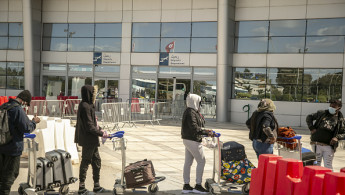Amnesty International, rights groups slam Tunisia president Kais Saied's 'racist' remarks
International rights groups on Thursday slammed Tunisian President Kais Saied for making "racist remarks" against migrants from sub-Saharan Africa, urging independent investigations into attacks fuelled by his rhetoric.
Saied said last month that migrants were behind most crime in the North African country and ordered officials to take "urgent measures" to tackle irregular migration.
Amnesty International and the Paris-based International Federation for Human Rights (FIDH) both condemned Saied's remarks and said his words had triggered a wave of violence against African migrants in Tunisia.
"President Saied must retract his comments and order investigations to clearly signal that anti-Black racist violence will not be tolerated," said Heba Morayef, Amnesty International's Director for the Middle East and North Africa.
"The community of Black African migrants in Tunisia is now gripped by fear of assault or being arbitrarily arrested and summarily deported".
Amnesty said it had interviewed 20 people in Tunis, including five asylum seekers and 15 undocumented migrants from Cameroon, Sierra Leone, Ghana, Nigeria, Guinea and Ivory Coast.
They were all attacked by mobs, and in at least three cases, the police were present but failed to intervene to stop the attacks or arrest the perpetrators, the group said.
FIDH said it had documented human rights violations including arbitrary arrests and detentions, assaults, evictions and dismissals in the weeks following Saied's remarks.
According to official figures, there are around 21,000 undocumented migrants from other parts of Africa in Tunisia, which is home to around 12 million people.
Saied on Wednesday denied racism following an outcry against his remarks, saying the aim of his speech had been to ensure respect for "Tunisian legality regarding foreigners" and to prevent any "jurisdiction parallel to that of the state".
But FIDH rejected Saied's clarification, saying it "did not even include an apology".
"When racist remarks are repeated, supported and assumed by an entire government, can we still speak of a way out?"





 Follow the Middle East's top stories in English at The New Arab on Google News
Follow the Middle East's top stories in English at The New Arab on Google News


